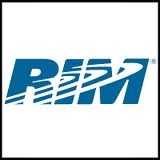 Research in Motion has been found liable for $147.2 million in damages for infringing patents held by Mformation Technologies. Mformation sued RIM in federal court in San Francisco in 2008, accusing it of infringement of two patents. Mformation is a maker of mobile-device management software. The software in question is called BlackBerry Enterprise Server.
Research in Motion has been found liable for $147.2 million in damages for infringing patents held by Mformation Technologies. Mformation sued RIM in federal court in San Francisco in 2008, accusing it of infringement of two patents. Mformation is a maker of mobile-device management software. The software in question is called BlackBerry Enterprise Server.
Mformation claimed that during licensing discussions, it had disclosed details of the technology to RIM. The company said in its complaint that after declining to take a license, the BlackBerry maker modified its software to include the patented systems. Jurors determined that RIM software that allows companies to manage their workers’ BlackBerry devices remotely infringed on Mformation’s patents. The verdict came after a trial that lasted three weeks.
The jury found that RIM should pay a royalty of $8 for each of the 18.4 million units sold with the software, for a total payment of $147.2 million. Amar Thakur, a lawyer for Mformation, said the jury’s damage award is for royalties on past sales of devices to American customers, excluding those in the government. Damages for future sales outside the United States and for government customers could increase the amount RIM must pay by two to three times.
According to court filings, RIM denied wrongdoing and said the patents were invalid. Crystal Roberts, a spokeswoman for RIM, has a request before the federal court to reverse the verdict, saying, “While the verdict is in favor of Mformation on some claims of the single patent remaining in suit, five of eight claims were found to be invalid. The court still has to decide the question of ‘obviousness’ with respect to the validity of the only patent in suit.”
The BlackBerry device maker has been trying to make a comeback after dropping behind Apple and Google in the smartphone market. RIM’s share of the global smartphone industry fell to 6.4% in the first quarter. Google’s Android increased to 59%, while Apple accounted for 23%.
